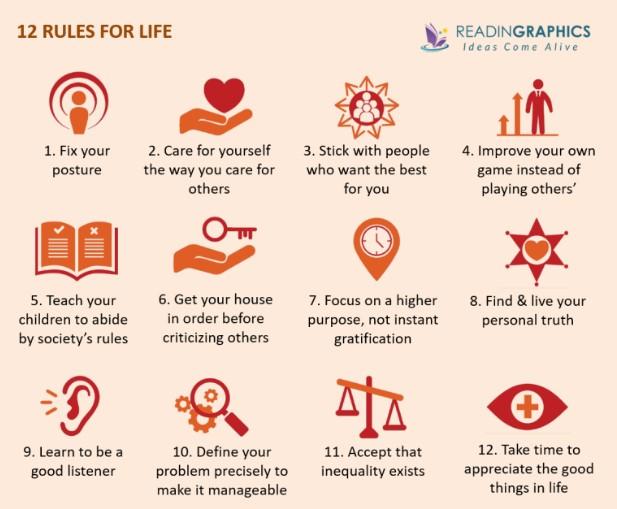Book Summary – 12 Rules For Life: An Antidote To Chaos
Curated from: readingraphics.com
Ideas, facts & insights covering these topics:
17 ideas
·6.97K reads
41
1
Explore the World's Best Ideas
Join today and uncover 100+ curated journeys from 50+ topics. Unlock access to our mobile app with extensive features.
12 Rules for Life by Jordan B. Peterson
Jordan Peterson suggests that Good is simply the prevention of Evil, and good rules that reduce unnecessary human suffering will help us to live better lives. The 12 Rules of Life in this book are built on the fundamental rule that we must each take responsibility for our own lives. Get your life in order and do the best for yourself, your society, and the world at large. Only then will you discover the true extent of your potential and resilience, while helping mankind to thrive collectively.
108
667 reads
Rule 1: Fix your Posture
All animals, including humans, are governed by dominance hierarchies and involuntary biochemical responses. Lobsters, for example, the battle for dominance. During a confrontation, 2 lobsters size each other up using their body/claw sizes and chemical secretions (which signal their health, strength, and mood). Dominant lobsters have higher serotonin levels, project greater confidence, a better posture, and can fight longer. An alpha lobster typically “wins” without even having to fight physically.
106
541 reads
After each confrontation, a lobster’s brain changes—the loser avoids further conflict, whereas the victor gains even higher confidence and serotonin levels. Similar patterns can be found in other animal species—generally, stronger animals get more food, better “homes”, higher status, better mates, and greater cooperation from others. That’s nature’s way of distributing scarce resources.
Likewise, humans have a dominance detector in our brains. How we perceive our social/economic status affects our well-being which reinforces our status in a positive feedback loop.
106
432 reads
People with strong self-esteem feel/transmit a sense of security and confidence, which makes them more attractive and respected. This improves their productivity and well-being, which further reinforces their self-perception. Higher serotonin levels are associated with greater resilience, happiness, health, lifespan, pro-social behavior, and leadership.
• On the other hand, people with a low self-perception feel insecure. They’re more likely to be stressed, jumpy, and reactive. They make poor decisions, fail to command respect/resources, which reinforce their loser complex.
110
368 reads
In short, our self-perception affects the vibes we transmit to create a self-reinforcing loop. If you feel like a loser for whatever reason, the first step is to break the negative cycle by correcting your posture.
• Don’t slouch. It conveys defeat and low status, which prompts others to treat you poorly and reinforces your low self-perception.
108
369 reads
• Fix your posture. Stand straight, push your shoulders back, speak up and make eye contact. This signals confidence to yourself and others. You’ll feel better, others will show you more respect, and it starts a virtuous cycle. It’s about standing tall, facing up to reality, and taking responsibility to become all you can be.
113
368 reads
Rule 2: Care for yourself like how you’d care for someone else
We tend to take better care of our pets than we do ourselves. When a pet is sick, we diligently follow the prescribed care. Yet, when we’re sick, we fail to fill/take our prescriptions.
105
423 reads
Rule 3: Surround yourself with people who want the best for you
We become the average of the people we spend the most time with. In the wrong company, we can end up in crime or even suicide. So, why do we hang around people who drag us down?
108
415 reads
Rule 4: Improve your own game instead of playing others’
In a highly-connected, populous world, you can always find someone who’s better than you—be it in looks, wealth, status, or relationships. No matter what you’ve achieved, you can still feel miserably inferior compared to others.
105
402 reads
Rule 5: Teach your children to abide by society’s rules
children aren’t born with social-cultural skills—they must be taught how the world works and how to navigate human society. Parents who don’t set clear boundaries for their young kids actually end up hurting them in the long run.
107
394 reads
Rule 6: Get your own house in order before criticizing others
Setbacks and suffering are inevitable in life. Some people respond with denial, helplessness, anger, or even acts of vengeance (e.g. genocide). Yet, others are positively transformed by adversity—they make peace with what happened and devote themselves to making a positive difference. Which type are you?
103
365 reads
Rule 7: Focus on a higher purpose, not instant gratification
We can use suffering as an excuse to live carelessly in the moment, or we can do something meaningful to minimize the suffering.
114
411 reads
Rule 8: Find your personal truth and live it
All of us are guilty of lying to ourselves and others. Find out why we lie, how we get stuck in a “life-lie” because, and what it means to find and live your personal truth.
107
365 reads
Rule 9: Learn to be a good listener
People need a listening ear. As a good listener, you can learn while helping others to solve problems.
105
388 reads
Rule 10: Define your problem precisely to make it manageable
We avoid looking deeply into a problem in hope that it’ll go away by itself, but this only causes the doubts and uncertainties to build up into a catastrophic failure.
104
368 reads
Rule 11: Accept that inequality exists
Some post-modernists argue that gender is entirely a social construct or a tool for men to oppress women and that hierarchies are created by the rich to exploit the poor. Peterson disagrees :)
103
378 reads
Rule 12: Take time to appreciate the good things in life
Suffering is inevitable and some people just seem to have a worse lot in life than others. Peterson’s own daughter suffered from a rare juvenile rheumatoid arthritis and was plagued with years of chronic pain. If you find yourself wondering about the seemingly-pointless suffering around us, this last rule from the 12 Rules of Life helps us to see things from a different perspective and to balance the good and bad in life so life seems worth living.
106
325 reads
IDEAS CURATED BY
CURATOR'S NOTE
Fantastic, it’s everything you expect from Jordan B. Peterson. A “self-help” style book, it beautifully interweaves history, religion, science, and philosophy into a highly pragmatic book on how to be a fulfilled, successful, better human being.
“
K 's ideas are part of this journey:
Learn more about leadershipandmanagement with this collection
The importance of innovation
The power of perseverance
How to think big and take risks
Related collections
Similar ideas
6 ideas
Seat Belt History
tedium.co
6 ideas
Just a moment...
motivatedprogress.com
3 ideas
Inaction Inertia Effect Related to UX Design
journals.sagepub.com
Read & Learn
20x Faster
without
deepstash
with
deepstash
with
deepstash
Personalized microlearning
—
100+ Learning Journeys
—
Access to 200,000+ ideas
—
Access to the mobile app
—
Unlimited idea saving
—
—
Unlimited history
—
—
Unlimited listening to ideas
—
—
Downloading & offline access
—
—
Supercharge your mind with one idea per day
Enter your email and spend 1 minute every day to learn something new.
I agree to receive email updates

